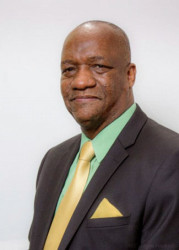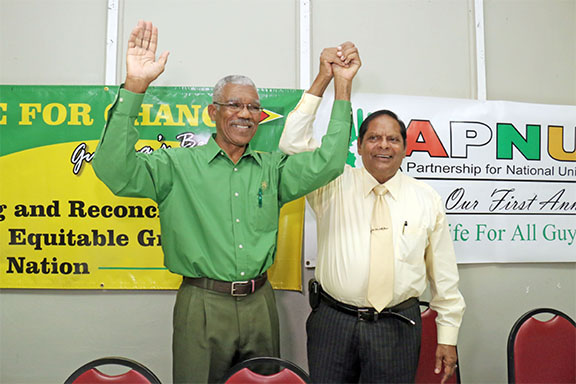When the Alliance for Change (AFC) meets with governing coalition partner A Partnership for National Unity (APNU) to review their pre-electoral alliance pact, the Cummingsburg Accord, its demands will include more structured inter-party communication.
The party will also be going to the talks with other issues, such as their participation in the local government elections set for next year and the 2020 general and regional elections.
“One of the most important issues is the dialogue between the parties. It has to be more structured as part of communication,” Minister of Public Infra-structure David Patterson, who is leading the review of the accord for the AFC, told Sunday Stabroek.
“The inter-party communication was not addressed in the original Cummingsburg Accord. It has to be addressed now. We want it formalized. Whatever construct the coalition agrees, it has to be a formal thing. The coalition needs to know a structure–both sides need to know when and where we will be meeting and how often and those things like that,” he explained.

The Cummingsburg Accord was signed for a minimum period of three years and a maximum of five years. But the AFC has also noted that it is a sunset pact, which requires early review ahead of the upcoming polls.
President David Granger, who is the leader of APNU, last Friday said that he welcomed the request by the AFC to have a review, as provided for.
“The AFC is entitled make their requests known. …Unfortunately or fortunately, depending on how you look at it, there is a requirement to review the Accord after three years and that three years will expire after midnight on the 13th of February, 2018. So, it is within in the right of the AFC to request a review. I don’t have a problem with that,” Granger told reporters.
This position was echoed by APNU General Secretary Joseph Harmon, who told Sunday Stabroek that while he is still to receive a formal request for the meetings, he, and is sure his party, looks forward to the discussions and resolutions coming out of them.
“We don’t have an issue with having it reviewed, because as agreements are they are affected by the day to day lives of people. The agreement is not crafted in stone that things cannot be changed as you go through. The APNU side doesn’t have a problem with the terms and conditions of the Accord. We believe it was a good thing for Guyana and continues to be a good thing for Guyana. It is always necessary for you to review agreements and this agreement provides a situation for review. We are open to the discussions and so on,” he said.
“I have not been officially notified by the [AFC], in writing, but I take notice of the statement made by the party. I think it is public knowledge and I would take that as notice, but they have not yet written to say we are requesting a specific date and time when we will meet for this or that. I think we are experienced enough to know that once that information is put in the public domain, that we should take notice of it,” he added.
Convenient
Sunday Stabroek repeatedly tried over the last week to contact AFC leader Raphael Trotman to enquire if the process has been initiated formally. However, this has proven futile as calls and texts to his phone have gone unanswered.
Harmon, however, pointed out that there was no iron clad review period although he thought that the AFC’s request has come at a good time. “I believe it was a convenient time [the anniversary] and maybe it is a good point for the review,” he said.
He explained that he could not state how long the review process would take once decided on, since it is unclear what modifications to the agreement are being sought by the AFC. “I don’t know what is the extent of it—their proposals. So, we can’t say it will be completed by x or y time and so on, because you see there is no imperative for any changed conditions right away. Basically, depending on the depth of the conversations which will take place, I believe that at that point we will determine how long it will take and so on,” Harmon added.
Patterson said that he feels that the timeframe given to complete the negotiations is not too little since the first agreement was completed “within one or two weeks”, and in this case there is at least two months. He said that the review process should not take long also because “It is something that we already have. The ground work has already been laid, so I don’t see time being an issue at all.”
Under the agreement, the coalition had said that “both parties commit “to accept and promote dialogue, discussion and the use of constitutional means to advance economic, political and social change; respect the value and sanctity of human life; maintain high levels of mutual respect; reject ethnicity as a consideration for the participation of citizens in government, denounce corruption and promote financial transparency, probity at all levels of government.”
The AFC has since earlier this year appointed a team to review the Accord but last week its National Executive Committee (NEC), following a meeting, announced that it wanted the review by next February.
After the coalition had entered office in May, 2015, there were immediate concerns that the AFC’s leading member in the government, Prime Minister Moses Nagamootoo, was being sidelined in favour of Harmon. Though he was number two in government, Nagamootoo had few portfolio responsibilities, while Harmon’s portfolio was multifaceted and kept expanding. There were also concerns in other areas.
The Accord had provided for the Prime Minister to chair Cabinet meetings but following the coalition’s ascension to office, it was stated that such a practice would be in breach of the country’s Constitution.
Article 106 (3) of the Constitution states that the President shall preside over Cabinet meetings although it also sets out that the Prime Minister shall do so in his absence.
More recently, the AFC has come in for strong criticisms from within its own executive over its public endorsement of Granger’s unilateral selection of 84-year-old retired judge James Patterson as Chairman of the Guyana Elections Commission.
This issue saw the withdrawal of the Canadian Chapter.
‘Refining’
Patterson said that the NEC’s decision to mandate Trotman to write government for a review of the Accord was not based not on any one issue but the feelings by its executives that clear explanations and guidelines were needed on matters in the agreement.
“There are several areas that our membership has asked us to look at, including the whole issue of the relationship with our partners as well as a clear understanding of discussions and resolution agendas going forward. There is not any one specific matter, as there are several areas that were raised that needed refining. It is a discussion process,” he noted.
Since matters pertaining to local government elections never formed a part of the Accord, the party expects that they will during the review.
“Local government is one of the areas that was omitted… but the construct of how we go ahead in local government, in what format, if we are going to go as a coalition, we need a full agreement on how that is going to be done. So that is one issue they asked that we raise with our counterparts,” Patterson explained.
“It is not a question of power or authority or anything like that. The group would like to have a clear understanding. Just as how we have a clear understanding of Cabinet, the relation of authorities and those things like that, we need to have a clear understanding of local government and several matters going forward. It is just a review of several issues that would have come up at our NEC,” he added.
However, Patterson said “one of the most important issues” is the internal party dialogue, while saying that “it has to be more structured as part of communication.”
“Say how we know the structure of the Cabinet… once we have an agreed documented procedure that would be okay by us,” he said.
Among the terms of the Cummings-burg Accord were that the APNU would nominate the coalition’s Presidential candidate and AFC would nominate the Prime Ministerial candidate. The AFC was assured of 12 seats in the National Assembly and that that Cabinet positions would be allocated on a 60/40 basis between the APNU and the AFC, respectively.
Also, in the construct of a new government, the APNU was to be allocated one Vice-President and AFC two Vice-Presidents, both of whom will be members of the Cabinet. The Accord also stated that in reflecting the thinking and commitment to and for future constitutional reform, it had been agreed that the Presidency will be reorganized along several lines.
It was agreed that the President as Head of State, Head of Government, and Commander-in-Chief of the Armed Forces shall have responsibility for the appointment of constitutional agencies and commissions with the required and agreed democratic mechanisms of consultation and appointment. The President would also have responsibilities for Foreign Affairs, International Relations and Non-Commercial Treaties as well as National Security Policy, the Defence Board, the Joint Intelligence Committee, and the Guyana Defence Force, among other things.
It was agreed also that the president would delegate the following responsibilities to the Prime Minister: – Domestic National Affairs and Chairing Cabinet; Recommending Ministerial appointments and providing the organizational structures of Ministries for the approval of the President; Appointment of Head of Agencies and Non-Constitutional Com-missions with the required and agreed democratic mechanisms of consultation and appoint; and Domestic Security (Home Affairs).
The coalition also touted inclusionary democracy and promised that the nation would see this materialized as a re-energizing of citizens through openness and access to their representatives. It promised a government “which treats all citizens as equal under the law; through the sharing of information on matters of public interest and through subjugating partisan politics to the national interest. People’s interest in participation in the political life, especially among the marginalized segments of the population, in this way will be rekindled. Young people, particularly, should be motivated and mobilized to take a more active role in political life and the development of the nation.”







